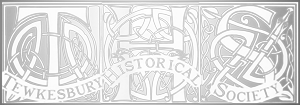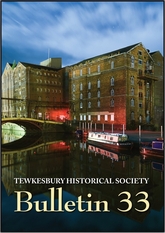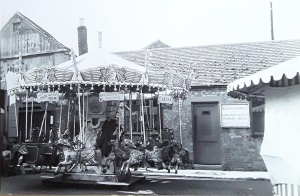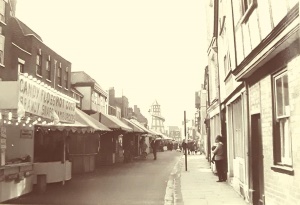The Mop Fair
Tewkesbury Register, 15th of October 1932
The coming and passing of Tewkesbury October fair, gives rise to reflections upon its origin and significance.
It is the outcome and survival of an ancient custom which has obtained for many centuries in this and the countries of Europe. Most of the famous fairs of Medieval times in England and upon the Continent, with their tolls and other revenues and their limits of time and space, were grants from the Sovereign to Abbots Bishops and other ecclesiastical dignaturies and a fair was generally held during the period of a Saint's feast, and in the precincts of the church - the time and place of the chief popular assemblages, but in England this desecration of the Church and Churchyard was forbidden by statutes of Henry III and Edward II. So very intimate was the connection between the fair and the feast of the Saint, that the former has very commonly been regarded as an off-shoot or development of the latter. Nevertheless, there are grounds for the supposition that fairs were already existing national institutions long before the church turned or was privileged to turn them to her own profit. People assembled at fairs with the main object of selling and purchasing merchandise, but with this was associated the pleasure of social intercourse and public enjoyment.
In the early part of the last century [the 19th] there were seven annual fairs in Tewkesbury, but in consequence of some of them interfering with other fairs and great markets in the neighbourhood, it was agreed at a public meeting in 1827 to discontinue two of them, leaving five to be held - on the second Monday in March, the second Wednesday after the 4th September for cheese, wool, and as well as for livestock, and on October 10, but the great day for hiring servants was on the 10th October. Many of our readers will remember this hiring custom - now fallen into disuse - and also the two "mops" referred to, the latter of which was commonly termed the "runaway mop."
Our fairs for the sale of stock - on alternate Wednesday - and the October pleasure fair, are survivals of ancient system, the last named, though devoid of mercial aspect, being the most striking link with practices of the past.
The fair tolls are the perquisites of the Corporation, and we understand that they are this year more substantial than for many years past, and will be a welcome addition to our public funds.
The amount derived from the generosity of the amusement caterers who ran their shows on Saturday evening for Tewkesbury medical charities was also great than ever. Monday's fair was extraordinarily free from disorder, which was an outstanding characteristic of the fairs in days gone by. A word of commendation is due to the Borough Surveyor (Mr W. Ridler) for the excellent arrangements he made in the disposal of the sites of the various fair paraphernalia and for having arranged the clearance of the streets so early on Tuesday morning. the obstruction of the streets common on these occasions was reduced to a minimum, and with the capable aid of the police, there was little delay in the traffic.
Further reading about Mop Fairs is available on Wikipedia
Arthur Gibbs (1898) on the Cirencester Mop Fair
‘A Cotswold Village’ is a classic of its sort. First published in 1898 it describes rural life as viewed by the ‘squire’ of Ablington Manor, which is a somewhat slanted view, particularly regarding the attitudes of the labouring classes. The author, J Arthur Gibbs was born in 1867 and educated at Eton and Christ Church College, Oxford. He spent two years in London working in the family banking firm before moving to the Cotswolds to live as the squire of a small estate. He was a keen cricketer, playing for Somerset and the MCC and writing 'The Improvement of Cricket Grounds on Economic Principles'. He also enjoyed hunting, shooting and fishing. He died of heart failure in 1899, aged 31. The following is an extract from ‘A Cotswold Village’, describing the Cirencester fair 125 years ago. Probably all that has changed is the technology of the ‘whirly-go-rounds’.‘One of the old institutions which still remain in the Cotswolds is the annual ‘mop’, or hiring fair. At Cirencester these take place twice in October. Every labouring man in the district hurries into the town, where all sorts of entertainments are held in the marketplace, including ‘whirly-go-rounds’, discordant music, and the usual ‘shows’ Which go to make up a country fair. ‘Hiring’ used to be the great feature of these fairs. In the days before local newspapers were invented every sort of servant, from a farm bailiff to a maid-of-all-work, was hired for the year at the annual mop. The word ‘mop’ is derived from an old custom which ordained that the maid servants who came to find situations should bring their badge of office with them to the fair. They came with their brooms and mops, just as a carter would tie a piece of whipcord to his coat, and a shepherd’s hat would be decorated with a tuft of wool.
Time was when the labouring man was never happy unless he changed his abode from year to year. He would get tired of one master and one village, and to be off to Cirencester mop, where he was pretty sure to get a fresh job. But nowadays the Cotswold men are beginning to realise that ‘two removes are as bad as a fire’. The best of them stay for years in the same village. This is very much more satisfactory for all concerned. Deeply rooted though the love of change appears to be in the hearts of nine-tenths of the human race, the restless spirit seldom enjoys real peace and quiet; and the discontent and poverty of the labouring class in times gone by may safely be attributed to the never ceasing changes and removal of their belongings to other parts of the country.
Know that these old fairs no longer answer the purpose for which they existed for hundreds of years, they will doubtless gradually die out. And they have their drawbacks. An occasion of this kind is always associated with a good deal of drunkenness; the old marketplace of Cirencester for a few days in each autumn becomes a regular pandemonium. It is marvellous how quickly all traces of the great show are swept away and the place once more settles down to the normal condition of an old-fashioned though well-to-do country town.’

Tewkesbury Fair Society

to Expand
to Expand





Comments